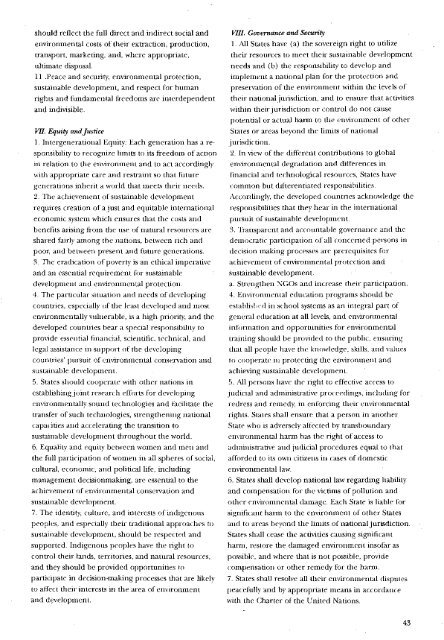ikke alle grise er ens — glædelig øko-jul! - LøS
ikke alle grise er ens — glædelig øko-jul! - LøS
ikke alle grise er ens — glædelig øko-jul! - LøS
You also want an ePaper? Increase the reach of your titles
YUMPU automatically turns print PDFs into web optimized ePapers that Google loves.
should reflect the full direct and indirect social and<br />
environmental costs of their extraction, production,<br />
transport, marketing, and, wh<strong>er</strong>e appropriate,<br />
ultimate disposal.<br />
11. Peace and security, environmental protection,<br />
sustainable development, and respect for human<br />
rights and fundamental freedoms are int<strong>er</strong>dependent<br />
and indivisible.<br />
VII. Equity and Justice<br />
1. Int<strong>er</strong>gen<strong>er</strong>ational Equity: Each gen<strong>er</strong>ation has a re<br />
sponsibility to recognize limits to its freedom of action<br />
in relation to the environment and to act accordingly<br />
with appropriate care and restraint so that future<br />
gen<strong>er</strong>ations inh<strong>er</strong>it a world that meets their needs.<br />
2. The achievement of sustainable development<br />
requires creation of a just and equitable int<strong>er</strong>national<br />
economic system which <strong>ens</strong>ures that the costs and<br />
benefits arising from the use of natural resources are<br />
shared fairly among the nations, between rich and<br />
poor, and between present and future gen<strong>er</strong>ations.<br />
3. The <strong>er</strong>adication of pov<strong>er</strong>ty is an ethical imp<strong>er</strong>ative<br />
and an essential requirement for sustainable<br />
development and environmental protection.<br />
4. The particular situation and needs of developing<br />
countries, especially of the least developed and most<br />
environmentally vuln<strong>er</strong>able, is a high priority, and the<br />
developed countries bear a special responsibility to<br />
provide essential financial, scientific, technical, and<br />
legal assistance in support of the developing<br />
countries' pursuit of environmental cons<strong>er</strong>vation and<br />
sustainable development.<br />
5. States should coop<strong>er</strong>ate with oth<strong>er</strong> nations in<br />
establishing joint research efforts for developing<br />
environmentally sound technologies and facilitate the<br />
transf<strong>er</strong> of such technologies, strengthening national<br />
capacities and accel<strong>er</strong>ating the transition to<br />
sustainable development throughout the world.<br />
6. Equality and equity between women and men and<br />
the full participation of women in all sph<strong>er</strong>es of social,<br />
cultural, economic, and political life, including<br />
management decisionmaking, are essential to the<br />
achievement of environmental cons<strong>er</strong>vation and<br />
sustainable development.<br />
7. The identity, culture, and int<strong>er</strong>ests of indigenous<br />
peoples, and especially their traditional approaches to<br />
sustainable development, should be respected and<br />
supported. Indigenous peoples have the right to<br />
control their lands, t<strong>er</strong>ritories, and natural resources,<br />
and they should be provided opportunities to<br />
participate in decision-making processes that are likely<br />
to affect their int<strong>er</strong>ests in the area of environment<br />
and development.<br />
VIII. Gov<strong>er</strong>nance and Security<br />
1. All States have (a) the sov<strong>er</strong>eign right to utilize<br />
their resources to meet their sustainable development<br />
needs and (b) the responsibility to develop and<br />
implement a national plan for the protection and<br />
pres<strong>er</strong>vation of the environment within the levels of<br />
their national jurisdiction, and to <strong>ens</strong>ure that activities<br />
within their jurisdiction or control do not cause<br />
potential or actual harm to the environment of oth<strong>er</strong><br />
States or areas beyond the limits of national<br />
jurisdiction.<br />
2. In view of the diff<strong>er</strong>ent contributions to global<br />
environmental degradation and diff<strong>er</strong>ences in<br />
financial and technological resources, States have<br />
common but dift<strong>er</strong>entiated responsibilities.<br />
Accordingly, the developed countries acknowledge the<br />
responsibilities that they hear in the int<strong>er</strong>national<br />
pursuit of sustainable development.<br />
3. Transparent and accountable gov<strong>er</strong>nance and the<br />
democratic participation of all conc<strong>er</strong>ned p<strong>er</strong>sons in<br />
decision making processes are pr<strong>er</strong>equisites for<br />
achievement of environmental protection and<br />
sustainable development.<br />
a. Strengthen NGOs and increase their participation.<br />
4. Environmental education programs should be<br />
established in school systems as an integral part of<br />
gen<strong>er</strong>al education at all levels, and environmental<br />
information and opportunities for environmental<br />
training should be provided to the public, <strong>ens</strong>uring<br />
that all people have the knowledge, skills, and values<br />
to coop<strong>er</strong>ate in protecting the environment and<br />
achieving sustainable development.<br />
5. All p<strong>er</strong>sons have the right to effective access to<br />
judicial and administrative proceedings, including for<br />
redress and remedy, in enforcing their environmental<br />
rights. States shall <strong>ens</strong>ure that a p<strong>er</strong>son in anoth<strong>er</strong><br />
State who is adv<strong>er</strong>sely affected by transboundary<br />
environmental harm has the right of access to<br />
administrative and judicial procedures equal to that<br />
afforded to its own citiz<strong>ens</strong> in cases of domestic<br />
environmental law.<br />
6. States shall develop national law regarding liability<br />
and comp<strong>ens</strong>ation for the victims of pollution and<br />
oth<strong>er</strong> environmental damage. Each State is liable for<br />
significant harm to the environment of oth<strong>er</strong> States<br />
and to areas beyond the limits of national jurisdiction.<br />
States shall cease the activities causing significant<br />
harm, restore the damaged environment insofar as<br />
possible, and wh<strong>er</strong>e that is not possible, provide<br />
comp<strong>ens</strong>ation or oth<strong>er</strong> remedy for the harm.<br />
7. States shall resolve all their environmental disputes<br />
peacefully and by appropriate means in accordance<br />
with the Chart<strong>er</strong> of the United Nations.

















